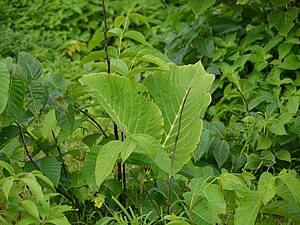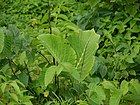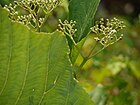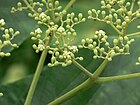Note: This is a project under development. The articles on this wiki are just being initiated and broadly incomplete. You can Help creating new pages.
Difference between revisions of "Leea macrophylla - Hastikarna"
(→Common names) |
|||
| Line 11: | Line 11: | ||
==Common names== | ==Common names== | ||
| − | {{Common names|sa=|en=|gu=|hi= | + | {{Common names|sa=Samudrika|en=Hathikana|gu=|hi=Hathikana|mr=Gajakarni}} |
==Properties== | ==Properties== | ||
Revision as of 16:51, 25 April 2019
Contents
- 1 Uses
- 2 Parts Used
- 3 Chemical Composition
- 4 Common names
- 5 Properties
- 6 Habit
- 7 Identification
- 8 List of Ayurvedic medicine in which the herb is used
- 9 Where to get the saplings
- 10 Mode of Propagation
- 11 How to plant/cultivate
- 12 Commonly seen growing in areas
- 13 Photo Gallery
- 14 References
- 15 External Links
Uses
Sexual debility, Guineaworm, Ringworm, Cancer.
Parts Used
Chemical Composition
The leaves contain an abundance of of phenolic constituents such as flavonoids, leucoanthocyanidins, p-hydroxybenzoic acid, syringic acid and gallic acid.[1]
Common names
| Language | Common name |
|---|---|
| Kannada | NA |
| Hindi | Hathikana |
| Malayalam | NA |
| Tamil | NA |
| Telugu | NA |
| Marathi | Gajakarni |
| Gujarathi | |
| Punjabi | NA |
| Kashmiri | NA |
| Sanskrit | Samudrika |
| English | Hathikana |
Properties
Reference: Dravya - Substance, Rasa - Taste, Guna - Qualities, Veerya - Potency, Vipaka - Post-digesion effect, Karma - Pharmacological activity, Prabhava - Therepeutics.
Dravya
Rasa
Guna
Veerya
Vipaka
Karma
Prabhava
Habit
Identification
Leaf
| Kind | Shape | Feature |
|---|---|---|
Flower
| Type | Size | Color and composition | Stamen | More information |
|---|---|---|---|---|
| {{{5}}} |
Fruit
| Type | Size | Mass | Appearance | Seeds | More information |
|---|---|---|---|---|---|
Other features
List of Ayurvedic medicine in which the herb is used
Where to get the saplings
Mode of Propagation
Seeds, Air layering, Cuttings.
How to plant/cultivate
Species in this genus generally succeed in full or partial sun, preferring a moist, fertile, well-drained soil[3]
Commonly seen growing in areas
Photo Gallery
References
- ↑ chemistry
- ↑ ["morphology"]
- ↑ 'Cultivation'
External Links
Categories:
- Pages that are stubs
- Ayurvedic Herbs known to be helpful to treat Sexual debility
- Ayurvedic Herbs known to be helpful to treat Guineaworm
- Ayurvedic Herbs known to be helpful to treat Ringworm
- Ayurvedic Herbs known to be helpful to treat Cancer
- Herbs with Leaves used in medicine
- Herbs with Fruits used in medicine
- Herbs with common name in Hindi
- Herbs with common name in Marathi
- Herbs with common name in Sanskrit
- Herbs with common name in English
- Habit - Shrub
- Index of Plants which can be propagated by Seeds
- Index of Plants which can be propagated by Air layering
- Index of Plants which can be propagated by Cuttings
- Herbs that are commonly seen in the region of Open vegetation
- Herbs that are commonly seen in the region of Dry forest
- Herbs




